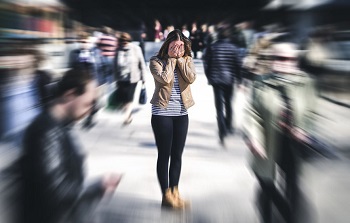Dizziness could be a symptom of a Panic Attack
For many of us, some experience of dizziness is normal, whereas, panic attacks are quite rare. Your dizziness could be a symptom of a panic attack, but it’s unlikely. If dizziness is a regular problem for you, see your doctor to investigate the cause.
Dizziness can manifest in several ways. It could be lightheadedness, feeling faint or a more general out of sorts experience of unsteadiness or a spinning sensation. It can also be accompanied by a loss of balance, even nausea and vomiting.
For many people, their dizziness is probably quite recognisable as a symptom from something they are aware of. You might have a flu, be heat affected or dehydrated, suffering from an overzealous exercise session, hungry … or on a boat in high seas (seasickness). For others, with known underlying health issues, their dizziness could signify blood pressure problems, migraine, low blood sugar (hypoglycemia) or low iron (anaemia), which they have medication to correct. In other cases, the dizziness could be a symptom of an undiagnosed disorder or infection, including panic attacks.
What are Panic Attacks?
Panic attacks can be a frightening experience. Overwhelming fear, uncertainty and loss of control creates this ‘panic’, often with heart palpitations, shortness of breath and the shakes among possible symptoms. Attacks are often without a specific trigger or warning, but are sudden and intense. Though they’re quick to occur, and peak in intensity in the first 10 minutes, most panic attacks will settle within 20-30 minutes, though some can last more than an hour. Over time, like with an anxiety disorder, you may come to understand the situations which might trigger an attack.
Dizziness does not have to be a symptom of a panic attack. Panic attacks can be diagnosed. A doctor will look for at least four indicators from a list of known symptoms, of which dizziness is just one. Other possible symptoms include; sweating, trembling, shortness of breath, a choking sensation, tightening of the chest, nausea, fear of dying or losing your mind, feeling hot or cold, a numbness or tingling, heart palpitations, and feeling unusually detached from yourself.
Other causes of Dizziness
Alternative causes of dizziness include a variety of disorders, especially those affecting the inner ear, which controls balance. Vertigo is one of these problems. If you suffer from vertigo, you think you are moving when you’re not, with unsteadiness and dizziness as a consequence. The phenomenon of ‘sea legs’ is a form of vertigo, with an ongoing sense of movement on dry land after time spent at sea. People who suffer migraines may also experience dizziness, while some medications may cause dizziness as a side effect. Alcohol consumption is a well known cause of (usually) temporary dizziness and disorientation.
Dizziness can also be a symptom of several more serious problems, especially as we age. Dizziness is a known common symptom in anxiety diagnoses (rather than panic attacks), which is a mental health issue. In rare cases, dizziness can warn of possible stroke or a brain tumour. Dizziness can also be an indicator of a heart condition, where there’s a blockage or an arrhythmia causing a restriction or irregularity of blood flow to the brain.
Treatments for dizziness will depend on the likely cause of it. Treating any underlying condition will minimise the frequency or impact of a dizziness spell. Prevention is better than cure, so proper medical advice is needed.
If you unexpectedly experience dizziness you can try some simple actions to provide relief. If you have a dizzy spell, lie down until your initial dizziness passes. When you get up, do it slowly and move cautiously, keeping close to hand holds and support. Ensure you get plenty of rest. Drink plenty of water and avoid stimulants like caffeine, cigarettes, alcohol and drugs. If you experience recurrent episodes, with or without pain, seek medical advice.


